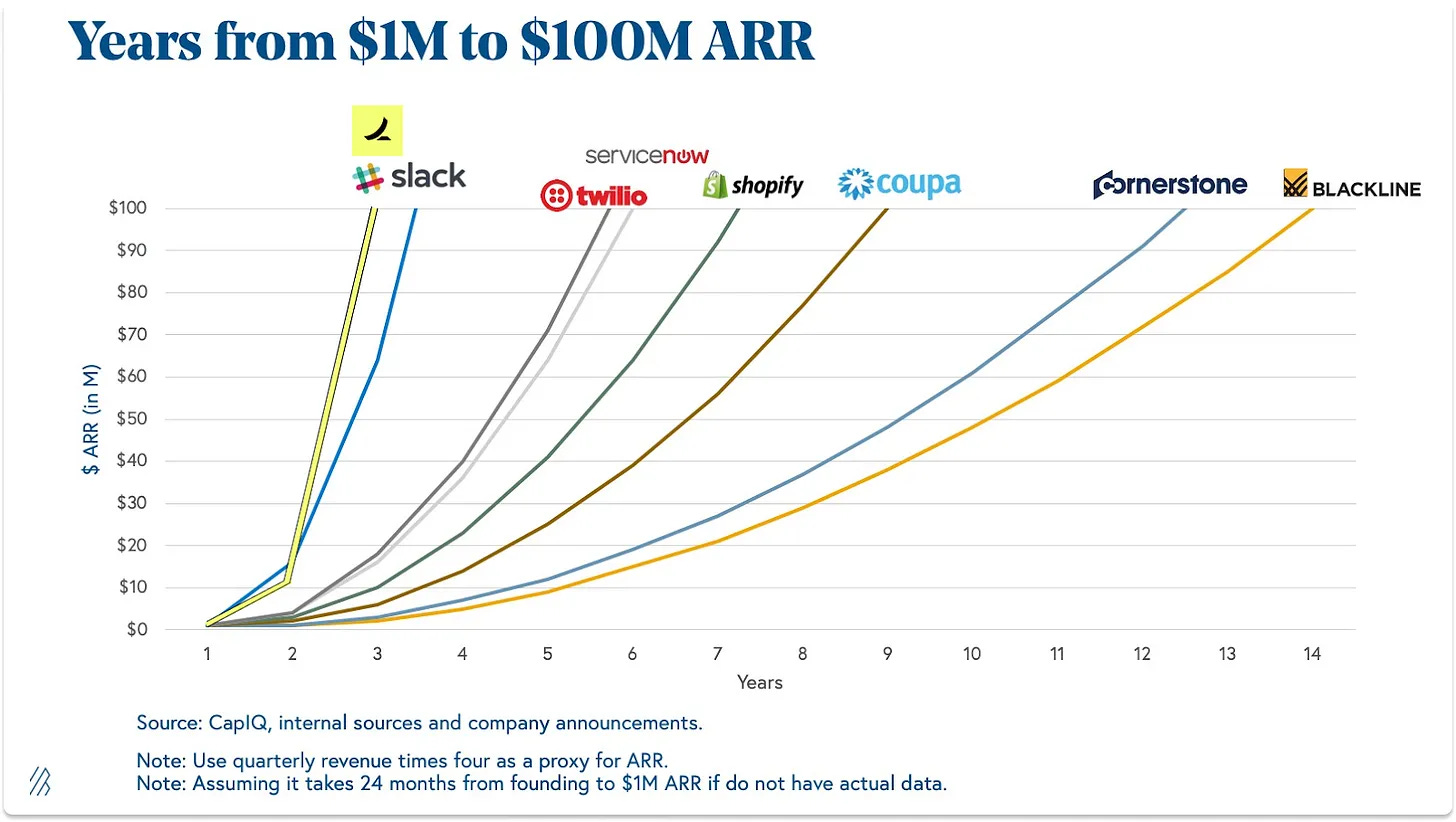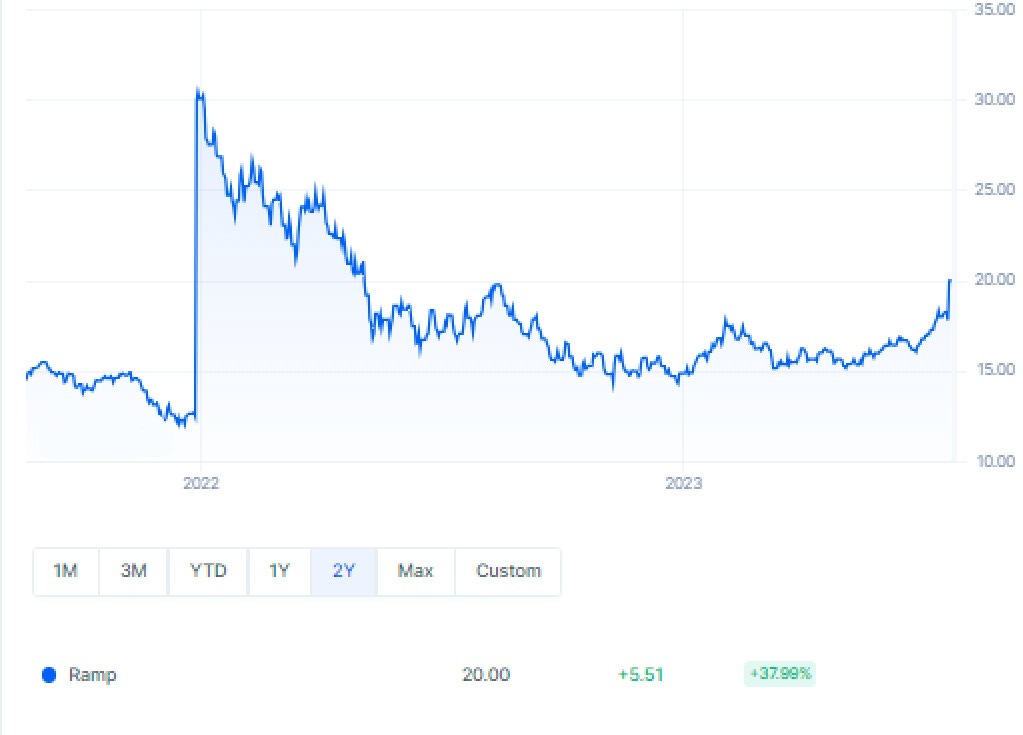Ramp - $5.8Bn Everything Store for Expenses
Ramp started with corporate cards, now the company is present in every aspect of business transactions, read more about their Google like approach to building products for business expenses.
Editor’s Note: Thank you to 47 new people who decided to subscribe to our newsletter, including execs from Amex, Vercel, and Instacart. Term Sheet Digest is a weekly newsletter for the Attack Capital community. If you are in the mood to read about private company stocks that are heating up in the secondary market and the biggest news around Silicon Valley, you are in the right place.
Ramp is building a corporate card and expense management platform for startups, the company competes directly with Brex & Amex in the corporate card space.
The company was founded in 2019 by Eric Glyman, Gene Lee, Karim Atiyeh. It raised $1.4Bn in total and is valued at $5.8Bn from blue-chip FinTech investors like Founders Fund, Coatue, Thrive, Stripe, and Goldman Sachs.
Unlike its competitors, Ramp focused on business cards vertically integrated with expense management instead of cashback and points which proved to be a winning strategy and repositioned the corporate card market towards savings instead of additional perks.
Google built a search layer on top of the internet.
If you need anything, you can search for it; Google redirects you to a seller and, in the process, takes a small advertising or listing fee from the seller.
In 2022, Google generated $282Bn in revenue from search.
Ramp is building a transactional layer for businesses.
Ramp, through their corporate card and expense management platform, wants to own the transactional layer of business spending - a $100 Trillion market.
Once it seeps itself into every part of a business transaction, the company wants to redirect purchases - just like Google redirects traffic - and take a small fee for it - just like Google took home $282Bn in “small’ fees.
The Beginnings
Eric Glyman, Gene Lee, and Karim Atiyeh were working at Capital One after the financial giant acquired their first company Paribus (YC S15), an online price tracker and deal hunter.
They realized when it comes to corporate cards and expense management, a lot of manual resources, as well as financial resources, are wasted, which could be easily saved if most of these broken and inefficient processes were automated.
Eric, Gene, and Karim talked to more than 100 entrepreneurs of early to late-stage companies about their issues and grievances with most corporate card and expense management solutions. They understood the problem, quit Capital One, and launched Ramp in 2019.
Ramp’s first product launch was its flagship corporate card which would simply save uncapped 1.5% of the company’s spending. Ten months after launching, Ramp was already at $200M in annualized GMV and $8M in annualized revenue.
Entrepreneurs didn’t want points, discounts, or additional deals that traditional corporate cards offered; they simply wanted to spend less - a promise on which Ramp delivered.
In 2022, Ramp announced that its corporate card helped its customers save $135 million and 3.5 million hours of labor.
Launch After Launch
Ramp’s strength comes from its product velocity, which is surprising because there are well-capitalized, and legacy players like Brex and Amex competing in the same space.
“Ramp’s product velocity is absolutely unprecedented in my 21 years working with technology businesses.” Keith Rabois, the Founders Fund partner who’s led or invested in every Ramp round over the past three years, is also a big fan of their speed.
After the instant success of their corporate card, Ramp wanted to embed itself deeper into their customer’s finances. Their customers were also looking for more visibility in their spending.
Ramp was quick to launch its expense management platform for its customers. This way, the company would also get access to transactions that are not going through their card and give customers a lot more visibility.
Ramp, with its expense management suite, also launched a Receipt Matching feature which at this point is the best in the market. Its optical character recognition (OCR) is being described as magic by its user; it automatically ingests even the hardest-to-read receipts.
The problem with most expense management solutions is that they are separate from the transactions. While most of the transactions that Ramp covers come from its card, if there are some additional unavoidable transactions, users can just upload the Receipts in the app or send them through text, and Ramp automatically saves them in the system.
Bill Pay was another hit in Ramp’s product suite. While most of the company’s expenses (subscriptions, outings, travel, etc.) go through the corporate card, the process of paying vendors is mostly manual.
Ramp’s Bill Pay, being true to the company’s ethos, automates this process, and saves thousands of hours of manual resources. Ramp automates everything, from the moment a company receives an invoice from a vendor to the moment the company finally closes their books.
Ramp also launched Ramp Flex as an additional feature for Bill Pay, which would allow their users to pay their vendors upfront using Ramp’s credit line. Users can then easily pay Ramp back in 30,60, or 90 days.
For Ramp, it’s not enough that users can pay their vendors on time seamlessly while saving thousands of manual hours; Ramp wants to negotiate the best price for you.
Currently, Ramp has 15,000 businesses, most of them top-tier venture-backed tech startups and all of them use the same products. Ramp owns the transaction layer and has a treasure trove of data on the prices most of the companies have negotiated. Ramp’s vendor management product not only provides financial insights on the vendors but also negotiates the best price for its users using the pricing data it collects from its customers.
Although Ramp has many top-class features and products to make transactions seamless, its best feature is its policy feature for finance teams.
Using the policy feature, finance teams can create rules around spending—by card, by vendor, by category, by department—and then Ramp can automatically enforce those rules on a card-by-card level. This simply removes the necessity for back and forth with the finance teams regarding when and where to use the card and other questions that come to mind. Most of the information regarding rules and guidelines is available on the app and can be accessed in seconds.
The company also launched its corporate travel card in 2022 to expand its product portfolio. Ramp allows users to book travel from whatever platform they prefer and – because they have control of the card – can enforce travel expense policies before any travel gets booked. Traditional corporate travel management platforms require users to use a separate interface to make sure policies are followed.
Integrations - Bringing It All Together
Ramp's promise to its users is to save them time and money by automating a maze of financial transactions and making the process seamless. To deliver on its promise, it needs to integrate with the majority of the products and software that its users use every day.
Ramp integrates with a wide range of apps to streamline customers’ finance operations. Integrations with apps like Gusto, Slack, Okta, 1Password, and Google SSO are some of its widely used ones.
Ramp’s priority referrals program also lets customers quickly open new accounts with banks in its network of 80+ partners. These connections allow customers to diversify their funds across multiple bank accounts while centralizing payments and enabling real-time visibility into their cash flows.
Competition
Ramp doesn’t only have Google-like ambitions; its story is also very similar.
When Google launched, it wasn’t the first search engine or even tenth in its category. But, it was the best, so it became the giant it is now.
When Ramp launched, Brex had already raised more than $300Mn+, and it was already declared as the winner in the category. Today Brex is at about $500M in annualized revenue, growing 50% year-over-year and doing about $20B in transaction volume.
Ramp, in comparison, is doing about $16B in transaction volume and $327M in annualized revenue, up 98% year-over-year, on track to hit $381M at the end of the year.
While Brex managed to raise $1.5Bn, Ramp has raised $1.4Bn.
Some other companies like Divvy (acquired by Bill.com in 2021 for $2.5B), Airbase ($641M valuation), and Teampay ($80M raised) are also competing in this space.
Secondary Market Performance
Ramp is backed by top fintech investors, and its tremendous growth makes it a highly sought-after company in the secondary market.
For the last year, the company has been trading actively in the secondary market while its price went down from $30 to $20, which is good when you see other FinTechs losing 50% of their valuation in the current market.
The company is currently in talks to raise another round of funding from its investors at a 32% valuation cut from $8.1Bn to $5.8Bn; comparing it with Stripe, which lost ~46% of its valuation in the down round, the deal seems good.
Top Stories
Instagram Threads will begin the rollout of one of its most-requested features: the ability to use the service via the web, while logged in. At launch, Threads users will be able to post, view their feed, and interact with posts from the desktop.
Private equity firm Trive Capital has acquired Hypergiant Industries, in a deal that will furnish the Texas-based AI company with capital to build even faster. Hypergiant’s core product is called CommandCenter, a geospatial data visualization platform designed to inform real-time decision-making.
Meta has created an AI model, SeamlessM4T, that can translate and transcribe close to 100 languages across text and speech. Available in open source along with SeamlessAlign, a new translation data set, Meta claims that SeamlessM4T represents a “significant breakthrough” in the field of AI-powered speech-to-speech and speech-to-text.
Please share this newsletter with your friends, family, and colleagues if you feel that it’ll add value to their lives - probably the best compliment we can get :)











